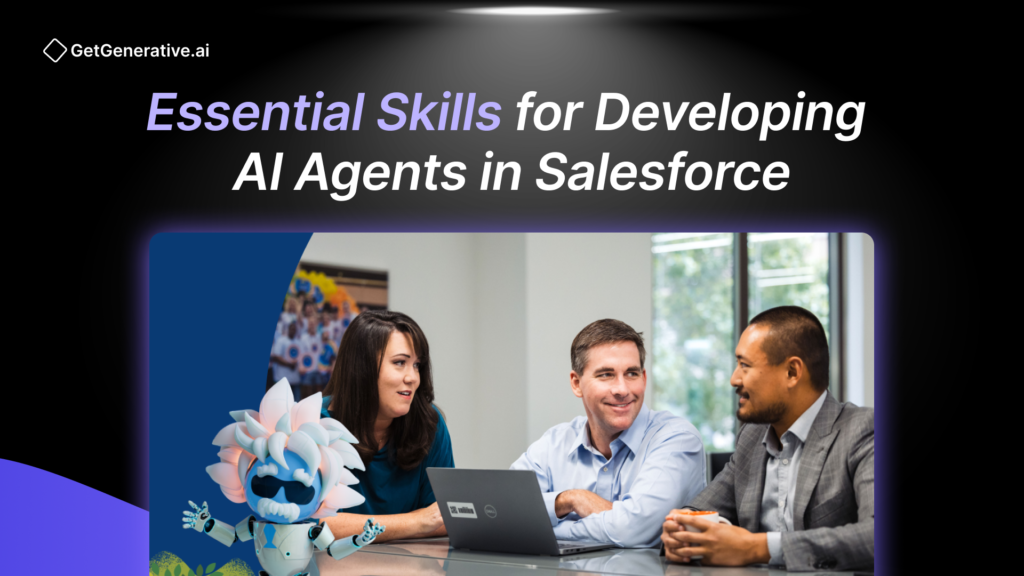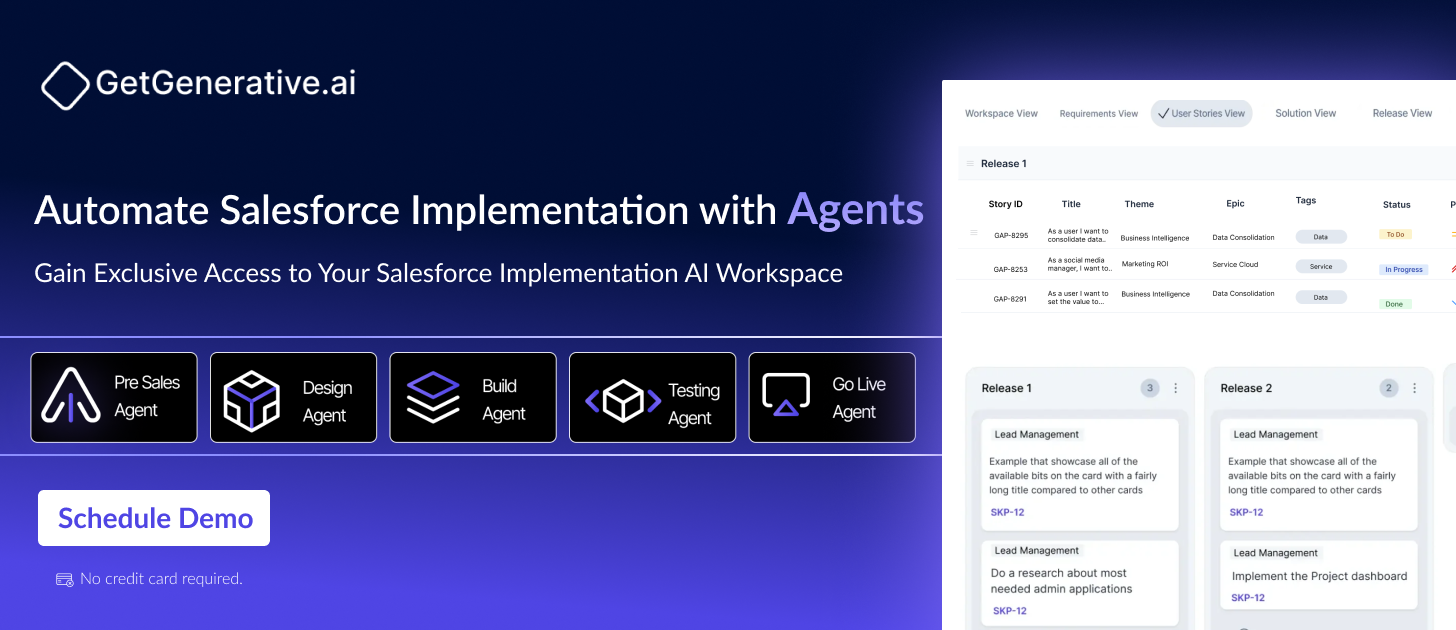Essential Skills for Developing AI Agents in Salesforce
According to Salesforce’s latest State of IT report, 86% of IT leaders anticipate that generative AI will soon play a prominent role in their organizations. AI-powered agents are transforming Salesforce by enabling businesses to streamline workflows, provide personalized experiences, and improve efficiency.
In this blog, we’ll dive deep into the technical, AI, and soft skills required to excel in AI-driven Salesforce development.
Understanding AI Agents in Salesforce
What Are AI Agents in Salesforce?
Unlike traditional AI models, which require predefined rules and human oversight, AI agents learn, adapt, and make real-time decisions based on data and user interactions.
Source: Precedence Research
Why Are AI Agents Important?
- Automate repetitive tasks, reducing manual effort.
- Enhance customer interactions with real-time recommendations.
- Personalize user experiences, improving customer satisfaction.
- Optimize sales and marketing strategies using predictive analytics.
- Scale operations effortlessly, handling large datasets efficiently.
As Salesforce continues to expand its AI capabilities through Einstein AI, Agentforce, and other AI-driven innovations, understanding how to build and implement AI agents has become a highly valuable skill set.
“Artificial intelligence and generative AI may be the most important technology of any lifetime.”
- Marc Benioff, Chair, CEO, and Co-Founder of Salesforce
The Role of AI in Automating CRM Workflows
AI-powered automation in Salesforce eliminates inefficiencies by streamlining key CRM processes:
- Sales Automation: AI agents analyze customer data to identify leads, suggest follow-ups, and optimize deal closures.
- Customer Service: AI chatbots and virtual assistants handle common inquiries, reducing response times.
- Marketing Campaigns: AI-driven recommendations personalize marketing efforts and enhance customer engagement.
- Data Analysis & Forecasting: AI-powered insights help businesses predict trends, identify opportunities, and mitigate risks.
Understanding these applications is the first step in becoming proficient in AI agent development within Salesforce. Now, let’s explore the essential technical skills required to build these intelligent agents.
Key Technical Skills for AI Agent Development
Proficiency in Apex and Lightning Web Components
At the core of Salesforce development lies Apex, Salesforce’s proprietary programming language. To build AI agents, developers must:
- Master Apex triggers and classes to enable AI-driven automation.
- Use Lightning Web Components (LWC) to create dynamic, AI-powered interfaces.
- Implement SOQL and SOSL to query, filter, and retrieve structured CRM data efficiently.
Since AI agents rely on real-time data, understanding how to optimize Apex code for performance and scalability is critical. Additionally, front-end development skills with JavaScript and LWC help create interactive dashboards and AI-powered widgets.
Understanding Salesforce Einstein and AI Integration
Salesforce’s Einstein AI brings advanced predictive analytics and automation to CRM processes. Developers must familiarize themselves with:
- Einstein Prediction Builder: Used to create AI models without code, predicting customer behavior and sales outcomes.
- Einstein Bots: Chatbots that leverage NLP to automate customer support and assist sales teams.
- Einstein Next Best Action: AI-powered decision-making for personalized customer interactions.
AI agents in Salesforce are deeply integrated with Einstein’s capabilities, enabling smarter recommendations, automated workflows, and intelligent sales strategies.
Machine Learning Fundamentals for AI Agents
AI agents require machine learning (ML) expertise to analyze patterns, recognize trends, and improve over time. Key ML concepts include:
- Supervised Learning: Training models using labeled datasets for predictions.
- Unsupervised Learning: Identifying hidden patterns in unlabeled data.
- Reinforcement Learning: Enabling AI agents to make decisions based on rewards and penalties.
Developers should also explore deep learning techniques such as neural networks for more sophisticated AI models. Understanding model training, tuning, and evaluation is vital for optimizing AI agents in Salesforce.
API Integration and Data Management
AI agents often interact with external systems, requiring seamless API integration. Developers must:
- Work with Salesforce REST and SOAP APIs for real-time data exchange.
- Utilize OAuth authentication for secure API access.
- Integrate AI-powered applications such as OpenAI’s GPT, IBM Watson, or Google Cloud AI for advanced NLP and machine learning capabilities.
In addition, data management skills are crucial, including:
- ETL (Extract, Transform, Load) processes for handling large datasets.
- Data cleansing and preprocessing to improve AI model accuracy.
- Real-time data streaming to enable AI agents to respond dynamically.
By mastering API integration and data handling, developers can enhance AI agents’ ability to interact with various platforms and optimize CRM workflows.
Key AI and Machine Learning Skills for Salesforce AI Agents
Natural Language Processing (NLP) for AI Chatbots
NLP is essential for creating intelligent chatbots and virtual assistants within Salesforce. Developers should:
- Learn text classification, sentiment analysis, and entity recognition.
- Implement intent recognition models to understand customer queries.
- Use pre-trained NLP models to improve chatbot responses and accuracy.
Salesforce Einstein Bots utilize NLP to enhance customer conversations, reduce response times, and improve support automation.
Predictive Analytics for AI-Driven Decision Making
AI agents use predictive analytics to make real-time business decisions. Developers should understand:
- Regression models for sales forecasting.
- Decision trees for customer segmentation.
- Clustering algorithms for identifying trends and insights.
“Some people call this artificial intelligence, but the reality is this technology will enhance us. So instead of artificial intelligence, I think we’ll augment our intelligence.”
- Ginni Rometty, Former Chairman and CEO of IBM
Essential Soft Skills for AI Agent Developers
AI solutions do not work in isolation—they require collaboration, problem-solving, and adaptability to evolving business needs.
Problem-Solving and Analytical Thinking
Developing AI agents involves handling large datasets, optimizing algorithms, and troubleshooting issues. Problem-solving skills help in:
- Identifying inefficiencies in AI workflows.
- Debugging machine learning models to improve accuracy.
- Optimizing AI-driven automation for better CRM performance.
Analytical thinking enables developers to interpret data patterns, recognize anomalies, and fine-tune AI decision-making models.
Communication and Collaboration
AI agent development requires close collaboration with stakeholders, product managers, data scientists, and end-users. Effective communication ensures:
- AI aligns with business goals and user needs.
- Development teams can translate technical insights into actionable business strategies.
- Seamless integration of AI agents into existing Salesforce workflows.
Clear documentation and training materials are also essential for user adoption and maintenance of AI agents.
Adaptability and Continuous Learning
AI technology is constantly evolving. Developers must:
- Stay updated on Salesforce’s AI advancements.
- Learn about emerging AI frameworks, models, and APIs.
- Participate in AI communities, webinars, and certification programs.
Best Practices for Building AI Agents in Salesforce
Ensuring Data Accuracy and Quality
AI models depend on high-quality data. Poor data can lead to biased models and inaccurate predictions. Best practices include:
- Cleaning and preprocessing data to remove inconsistencies.
- Using balanced datasets to prevent bias in AI recommendations.
- Implementing data validation checks to maintain model accuracy.
Salesforce’s Data Cloud helps AI agents access reliable, real-time data for better decision-making.
Implementing Ethical AI and Bias Mitigation
AI bias is a major concern in customer-facing applications. Developers must:
- Audit AI decision-making to identify biases.
- Use diverse training datasets to reduce bias in recommendations.
- Follow ethical AI guidelines, such as GDPR and responsible AI policies.
Salesforce has integrated bias detection tools into its AI framework to ensure fair and ethical AI.
Testing and Continuous Improvement
AI agents require constant monitoring and improvement. Developers should:
- Use A/B testing to compare different AI models.
- Analyze customer interactions and feedback to enhance AI performance.
- Implement real-time monitoring to detect and resolve issues quickly.
A well-optimized AI agent evolves based on usage patterns, business needs, and new AI advancements.
Conclusion
Developing AI agents in Salesforce requires a blend of technical expertise, AI proficiency, and soft skills. From mastering Apex and Einstein AI to understanding machine learning and ethical AI, professionals must stay ahead of AI innovations.
Unlock the power of AI-driven automation with GetGenerative.ai—an AI-powered Workspace + Agents designed to manage the entire implementation lifecycle, from Pre-Sales to Go-live, in Salesforce.
✅ Streamline workflows
✅ Enhance efficiency with AI agents
✅ Seamlessly manage projects from start to finish
Visit GetGenerative.ai and revolutionize the way you implement AI in Salesforce!
FAQs
1. What programming skills are essential for AI development in Salesforce?
Developers should have expertise in Apex (Salesforce’s programming language), JavaScript (for Lightning Web Components), Python (for AI/ML modeling), and SQL (for data management) to build AI agents effectively.
2. How does Salesforce Einstein AI enhance AI-driven automation?
Salesforce Einstein leverages machine learning, predictive analytics, and NLP to automate decision-making, enhance customer interactions, and optimize sales and marketing strategies.
3. Can AI agents be integrated with third-party applications in Salesforce?
Yes, AI agents can integrate with external applications using REST APIs, SOAP APIs, and Salesforce Connect for seamless data exchange and enhanced functionality.
4. What are some common challenges in developing AI agents in Salesforce?
Challenges include data quality issues, AI model bias, integration complexities, and maintaining continuous AI performance improvements. Developers must ensure AI agents are ethical, secure, and reliable.
5. Is AI development in Salesforce suitable for beginners?
While AI development requires a strong technical foundation, beginners can start with Einstein Bots, low-code AI solutions, and Trailhead courses before advancing into machine learning and AI model training.




